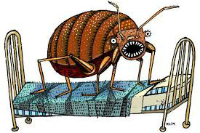Pest Control: Get Rid of Bed Bugs
 7 Things to Consider When Using Heat to Get Rid of Bed Bugs
7 Things to Consider When Using Heat to Get Rid of Bed Bugs
Can you get rid of bed bugs? Good question. If you are not a licensed applicator, you may lack the tools, products, and the know-how needed to deliver an effective treatment. In considering this, your efforts could be better spent trying to avoid picking up bed bugs in your travels. If you already have an infestation, a good option could be for you to call in a professional exterminator who will be able to get rid of bed bugs in your home.
I’m leaving a house, and my mind is starting to play tricks on me. After finishing a bed bug inspection in a seriously infested house, your body just starts to itch. I know that I didn’t pick up any bed bugs, and it is too soon to feel the effects even if I did, but I’m still freaked out. These are the moments where I can totally appreciate how the customer might be feeling. Bed Bugs are a freaky thing. I know there aren’t any on me, and I even feel like I need to get rid of bed bugs.
Now that we have established that bed bugs suck, you probably just want to know what the best solution is for you as a consumer. There are some pest control companies that can offer a solution for bed bug infestations. As a consumer, you will have a variety of tools, methods, and costs to choose from. Pest control style will lean towards more green solutions. With this in mind, I want to talk about seven things to consider when getting rid of bed bugs using a heat treatment.
Some things to consider, GOOD and BAD when shopping for a bed bug treatment
- Heat is green
- Heat requires limited prep work
- Heat is odor free
- Heat will be done in one day
- Heat must heat areas that are designed to resist temperature change
- Heat leaves NO residual treatment
- Heat is expensive
Many pest control customers will focus on the green aspect of any treatment. Heat treatments are a very “green solution” because they don’t involve any chemical products at all. The treatment is just what it says, heat. If you can raise the temperature to 125 degrees plus, you will be able to kill all stages of the bed bug life cycle. Also, heat treatments do not require very much preparation work for the homeowner. A traditional treatment requires a long list of steps the homeowner must take to ensure effective treatment. The heat is also odor free. Since there is no chemical product put around the structure, the customer will not have to deal with any odor at all. Also if a heat treatment is successful at getting rid of bed bugs, it will only take one day to finish. Other types of treatment will require a follow-up treatment in two weeks.
However, heat does have certain limitations. Your wall void is a good hiding spot for bed bugs. When getting rid of bed bugs with a heat treatment, you must allow the heat to reach every bug. This becomes an issue because certain areas are resistant to this change in temperature. Mattresses and wall voids are good examples of this. Wall voids are filled with insulation that is specifically designed to be resistant to temperature changes. It is difficult to be confident that the temperature increase will reach these areas. Also, the heat treatment leaves no residual behind. One big plus about a chemical treatment is that there are residuals left behind that will continue to work long after the exterminator leaves. Another factor to consider is the cost. Heat machines are expensive so that heat treatments will be as well. Also, a chemical treatment will usually require a follow-up treatment, depending on the level of infestation. This follow-up trip will have the effect of lengthening your warranty because the warranty will begin after the second trip.
Before you spend too much time debating what treatment method is most effective, remember that greater attention should be placed on the ability of the pest management professional that is implementing the control program. The quality of the company you choose and the level cooperation on your part will ultimately determine the level of control that can be achieved.
